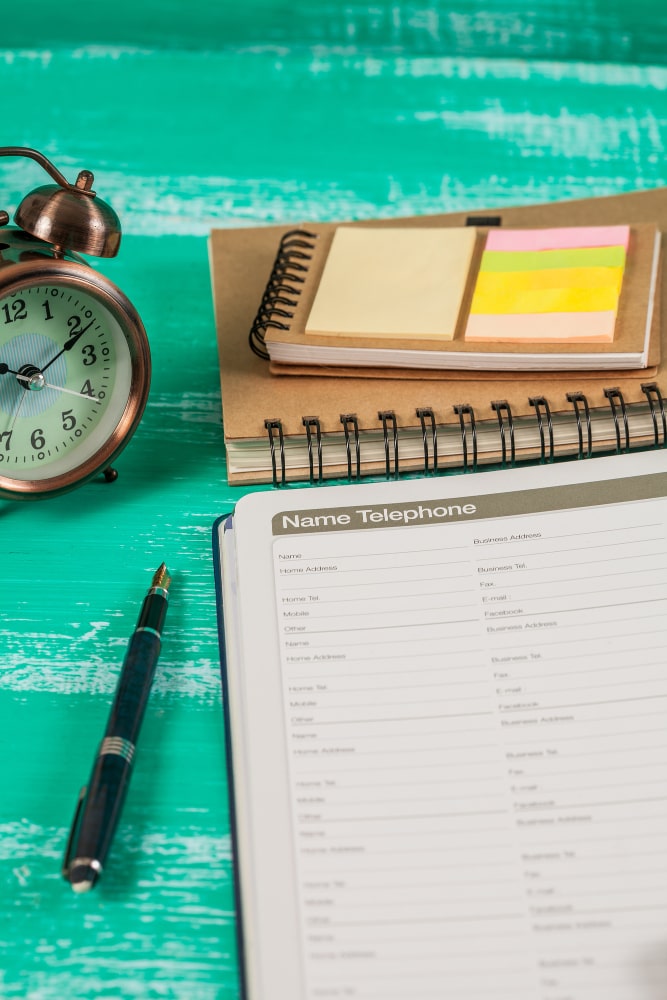
You know how it feels. The pressure is mounting as board exam season approaches. You want to help your student succeed, but those textbooks and flashcards can seem so daunting. With some thoughtful preparation, you can create an environment that sets your student up for exam success. In this article, we’ll explore five tips to help you optimize your student’s study space, schedule, habits, and mindset so they can conquer those exams with confidence. Let’s dive in and transform your home into a hub of productivity, focus, and academic achievement! Equipped with the right strategies, you and your student will be unstoppable.
1- Designating a Dedicated Exam Preparation Space

To prepare for your board exams, designate a quiet space in your home specifically for studying. Choose a spot away from distractions like TVs, phones and family members. Set up a desk, comfortable chair, proper lighting and storage for your materials. Having a dedicated study area signals your mind it’s time to focus and helps build an effective routine.
a- A Comfortable and Ergonomic Setup

click to rent furniture shown in the picture: https://cityfurnish.com/things/4026/hugo-study-combo
Invest in a sturdy desk and supportive chair so you can sit for long periods without discomfort. An ergonomic setup with lumbar support promotes good posture and concentration.
b- Consistent Study Habits
Stick to a regular study schedule, allocating time for each subject. Break up sessions into 25-50 minute intervals with short breaks to recharge. Studying at the same time each day establishes a routine, builds confidence and lessens anxiety. Track your progress to stay on schedule and make adjustments as needed. Celebrate milestones to stay motivated for the work ahead.
c- Balance Studying and Self-Care
While preparation is key, don’t neglect your health and wellbeing. Get 7-8 hours of sleep per night, eat balanced nutritious meals and exercise when possible. Engage in relaxing activities like meditation, deep breathing, or yoga. Your mental and physical health directly impact your focus, comprehension and test performance. Ask friends and family for encouragement and help reduce stress.
2- Invest in the Right Furniture for Board Exam Preparation

click to rent furniture shown in the picture: https://cityfurnish.com/things/3920/alexa-study-combo
The furniture in a student’s study space plays an instrumental role in determining their productivity and focus. Prioritize a sturdy desk and an ergonomic chair that provides lumbar support for long study hours. A desk with ample surface area gives students room to spread out books, notes, and other materials, keeping everything within easy reach.
a- Invest in a High-Quality Desk and Chair
A desk and chair designed for studying can make a world of difference. Look for a desk with a minimalistic design and scratch-resistant surface. An adjustable chair, ideally with built-in lumbar support and armrests, helps maintain good posture and prevents back strain during marathon study sessions.
b- Ensure Proper Lighting
Inadequate lighting can cause eye strain, headaches, and decreased concentration. Equip the study space with overhead lighting as well as a desk lamp. LED bulbs provide bright, natural-looking light while using less energy. Place the desk near a window to take advantage of natural light during the day.
c- Keep Supplies Organized
A clean, organized workspace minimizes distraction and stress. Provide storage solutions like drawer organizers, pen cups, file sorters and shelving to keep study materials, electronics, and supplies neatly arranged. Place frequently used items within easy reach on the desk surface. A bulletin board gives students a space to pin up important notes, reminders, and words of encouragement.
d- Allow for Breaks
While consistency is key, students also need opportunities to recharge. Build in short breaks every 90-120 minutes to rest their eyes, stretch, and step away from studying for a few minutes. Taking walks or light exercise provides mental respite and helps release pent-up energy and tension. Encourage activities that bring joy like listening to music, spending time with friends, or pursuing hobbies. With the proper balance of work and rest, students can maintain high productivity and motivation.
3- Establish a Consistent Exam Study Schedule

Consistency is vital when preparing for important exams. Establishing a regular study schedule helps build confidence and good habits while reducing stress and anxiety. As a student, creating a plan that allocates time for each subject and sticking to it can make a big difference in your productivity and focus.
a- Determine Study Frequency
Decide how often you need to study each topic to feel comfortable with the material. For more challenging subjects, you may need to schedule sessions 2-3 times a week. For topics you have a good grasp on, 1-2 times a week may suffice. Find what works for your own needs and learning style.
b- Break Down Study Sessions
Don’t try to cram everything into one long session. Split up your study time into manageable chunks of 30 to 90 minutes with short breaks in between to rest your mind. Start with the most difficult topics when your concentration is highest, then move on to easier subjects later. Keep your study sessions engaging by mixing up the topics and formats, such as practice problems, flashcards, reading notes, and watching tutorial videos.
c- Account For Life’s Responsibilities
Be realistic about your schedule and account for your other responsibilities like work, family events, chores, and rest. Build in buffer time in case life’s unexpected events come up. It’s better to schedule less time and be consistent than to overload your schedule and end up skipping study sessions. You can always add in extra time as needed when you have it.
A consistent study routine is essential for success. Make a plan, stick to it, and take good care of yourself along the way. While preparing for exams is challenging, maintaining a growth mindset and celebrating small wins will help motivate you to the finish line. You’ve got this! Stay focused and keep your eyes on the goal ahead. With dedication and persistence, you will be ready to ace those exams.
4- Encourage Healthy Habits During Exam Preparation

a- Get Enough Sleep
Exam prep can be mentally draining, so make sure to get 7-8 hours of sleep per night. Lack of sleep impairs focus and memory, negatively impacting retention and performance. Stick to a consistent sleep schedule, even on weekends, to ensure you’re well-rested for early morning study sessions.
b- Eat Nutritious Meals
A balanced diet provides the energy and nutrients needed to concentrate during long study periods. Focus on protein, whole grains, fruits and vegetables. Limit excess sugar and caffeine which can cause energy crashes. Staying hydrated also helps boost cognitive function, so drink plenty of water throughout the day.
c- Exercise Regularly
Even just 30 minutes of exercise per day can do wonders for reducing stress and improving mood and mental wellbeing. Go for a walk or jog, do some yoga, or just get outside for some fresh air. Physical activity provides an outlet to release pent up energy and tension, allowing you to feel recharged and refocused when studying.
d- Practice Self-Care
Make time each day to unwind and de-stress. Listen to relaxing music, read a book, or engage in a hobby you enjoy. Deep breathing, meditation, and journaling are all simple self-care techniques that can help alleviate anxiety and promote mindfulness. Talk to others about your feelings instead of bottling them up. Your mental and emotional health are just as important as your physical health during this demanding time.
Supporting and encouraging healthy habits in students helps build resilience, optimism and determination. Promoting balance and self-care leads to improved life skills that will benefit them far beyond the exam room. By maintaining a healthy body and mind, students can face their exams with confidence and achieve their full potential.
5- Provide Emotional Support and Encouragement

Exam preparation can be an emotionally draining experience for students. Offering your support and encouragement is crucial to helping them stay motivated and confident throughout the process.
- Reassure them that their efforts are valued and appreciated. Remind them to maintain a positive mindset, focus on growth and learning, and celebrate milestones along the way.
- Emotional support from friends and family makes a world of difference.
- Check in regularly to see how they’re coping with the workload and if they need any help. Let them know you believe in them and their abilities. Hearing words of affirmation and praise can help alleviate feelings of anxiety or self-doubt.
- While studying for long hours, it’s normal for students to feel overwhelmed or discouraged at times. Provide a listening ear so they have an outlet to express their frustrations. Offer empathy and help put their worries into perspective. Give advice and guidance to help them work through obstacles or find solutions to problems.
- Encourage balance in their routine with opportunities for leisure and social interaction.
- Taking short breaks prevents burnout and rejuvenates the mind and body. Engaging in physical activity or light exercise also releases feel-good hormones that boost mood and motivation. Make time for casual conversations and laughter – the psychological benefits of social bonding and support cannot be understated.
With the right support system in place, students will feel equipped to face the challenges of exam preparation head-on. While the journey may not always be easy, knowing they have people who care about their well-being and success can make all the difference in the world. With encouragement and emotional sustenance, they will thrive under pressure and achieve their full potential.
Take Away
So remember, while exam prep may feel stressful at times, you’ve got this! Stay focused on your goals, stick to a consistent study routine, nourish your body and mind, and lean on your support system when you need encouragement. With the right preparation and environment, you’ll walk into those exams feeling confident, focused and ready to succeed. Now go rock those tests!

